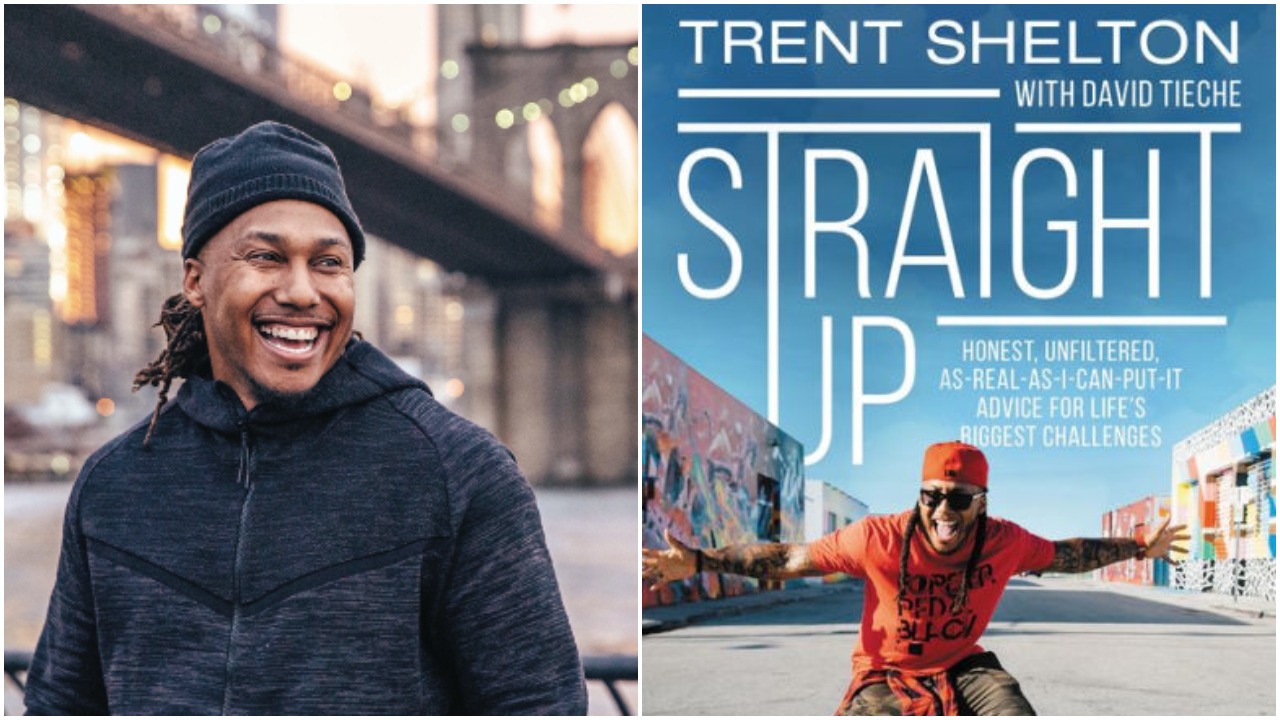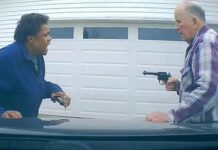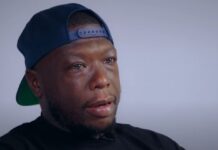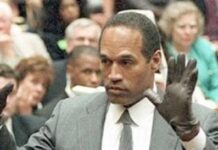
*We caught up with former NFL player-turned motivational speaker, and best-selling author Trent Shelton to dish about his newest book, Straight Up: Honest, Unfiltered, As-Real-As-I-Can-Put-It Advice for Life’s Biggest Challenges, which offers advice and insight to guide today’s young adults.
Shelton is considered one of the most significant speakers of his generation. He is known for being “The Most Impactful Speaker” and is ranked one of the “Top Influencers in the Personal Development Space.”.
His latest work, “Straight Up,” features insights, inspiring advice and life lessons for teens and young adults on a variety of topics such as: friendship, love, finding success, making it through trauma, having a healthy relationship with social media, identifying toxic relationships and how to forgive and overcome fear, via press release.
Get into our conversation with Trent Shelton below.
READ MORE: Viola CMO Ericka Pittman Talks Minority Ownership, Barriers in Cannabis Space [EUR Exclusive]
Listen to the whole episode here >> https://t.co/JFIqF9sVki (Straight Up is the #1 Podcast in the world right now in the education category) pic.twitter.com/OUsu7bLMZi
— Trent Shelton (@TrentShelton) December 13, 2019
Talk about the inspiration behind Straight Up?
Trent Shelton: Yeah, so I released my last book, The Greatest You, last year and that was more of my story and just the rehab time kind of journey and what rehab time is, and I’ve always had a heart for youth. I mean that’s why I started public speaking. I still to this day help mentor, and so I was like, man, there needs to be a book that’s just straight up and it’s just an easy read, because the thing about it, most people, but definitely kids, don’t like to read, and so I was like, I need to create something that’s a very simple to read, that’s broken up into different sections that they can really digest and apply.
And I kind of tested it with my son and I was like, “Hey, what do you think about this?” And he’s like, “Dad, I think my friends would love it and I think the world needs it,” and so I also thought about my childhood growing up. I had great parents, they were very straight up with me, but just … I guess in the totality of my childhood, I got a lot of, “Don’t do this,” but it wasn’t, “This is what happens if you do it,” and I think that would have saved me from a lot of trouble in my life and so this book is just that straight up holistic talk that I feel like a lot of people need.
Recalling your childhood/young adult memories for this book, was it therapeutic for you in any way?
Absolutely. I think anytime for me in creating, I’m usually pulling from past experiences. It just always reminds me of how far I’ve come. It always reminds me of just the bigger plan for my life when football was over and I thought nothing else was going to happen. So just going down those memories, sometimes it’s a little bit traumatic with the stories in the book, but it’s also just a reminder of how far I’ve actually come in my journey. So it definitely helps a lot.
What compelled you to get into motivational speaking? Was it a natural calling after your NFL career?
Yeah, but I was running from the calling. My whole entire life, I felt that people have spoken this all my life. I can remember I was five years old and somebody telling me this. My dad is a pastor, but I never wanted to do it, because obviously I was so focused on what I wanted to do, which was sports. I’m an introverted person by nature. I like to call myself a social introvert, but I’m an introverted person by nature, so public speaking was way off the radar, and it took one of my close friends having conversations with me and they said, “Man, Trent..you have what it takes,” and to make a long story short, he invited me to a speaking engagement. I gave that speaking engagement in front of 3000 kids. I was nervous, I was a wreck, but after I got off the stage, I realized that this was what I was supposed to do. It’s a feeling that is hard to explain, but it was just so much certainty and confidence in the midst of my biggest fear, in the midst of being uncomfortable, and I stopped pursuing football that night, and I walked into what people know today as Rehab Time.
STRAIGHT FACTS! pic.twitter.com/qRBMhbUyNV
— Trent Shelton (@TrentShelton) August 12, 2020
Are there any similarities between public speaking and playing football?
I think there are a few. Public speaking can actually be draining. Definitely if you’re up there for an hour moving around, so you definitely got to take care of your health for sure, but I would say the main similarity is being able to perform under pressure. So obviously with football, it’s 75,000 people in college or the professionals, at least 50,000 people in the crowd, and though you have a helmet on, but you have plays that are called for you, and if you don’t make these plays, you’re going to hear a lot of boos, you’re going to hear a lot of feedback, and so it teaches you how to perform under pressure. And it’s the same thing with public speaking. I think probably public speaking might be a little bit more pressure because everybody’s tuned in to you. It really taught me how to handle the pressure of an audience more than I thought. As I look back on my journey, football really prepared me for that.
Tell our readers about Rehab Time and the inspiration behind launching this nonprofit.
So rehab is an acronym. It stands for renewing every heart and body. I don’t say that enough. Some people don’t even know that. So it stands for renewing every heart and body, and it started in 2009. My football career was obviously up and down, I was released, I was cut … that’s a better word to put it than fired, and I was just at home, and these words popped up into my mind, and I think the inspiration came from … well I know the inspiration came from the word rehab, not necessarily drugs and alcohol, but from injury.
When you get hurt in sports, you got to rehab. The rehab process is very hard, and I think the hardest thing about it is patience, because as an athlete, you want to get back out there but if you get back out there too soon, you can get injured, and you can take that in any aspect of life, relationships, friendships, maybe trying to start your business and you do it too quickly, you can set yourself up for failure.
And so the word rehab for me means putting a strength back into a weakness, holistically, mind, body, and soul, and I just went on that journey, and Rehab Time, it started for me. I didn’t start it to have a nonprofit. I didn’t start it to be a speaker. I didn’t start it to write books. I call myself a silent giver. I don’t really post a lot online, but we’re blessing families right now during COVID-19 by giving families a thousand dollars a piece to be able to help out, and that’s because we have a great community of supporters who buy merchandise from us, who show up to these events, and so we’re able to funnel it back to the community.
Are there ways the community can get involved with Rehab Time?
Yeah. So right now a lot of it is … I mean, with COVID-19, things have changed, but we do things in the communities. I would say, follow @rehabtime on Instagram, but obviously we do things as far as volunteering at school, we do turkey drives, warm the homeless was something that we did, and so we look for volunteers just for different events, especially with sports. Athletically, we have an athletic program that we do where we help kids that can’t afford certain things to be able to play these sports or get the training necessary, because training these days for sports is expensive. It’s a luxury, and so we want to be able to provide a high level of training for kids who maybe can’t afford it. So just go to @rehabtime, and we’re always doing something and you can get involved.
Stop allowing your loyalty to ruin your life. Stop giving your loyalty to the wrong people. Stop letting your loyalty become your slavery. Don’t let your good heart keep you in situations that are breaking your heart.
— Trent Shelton (@TrentShelton) July 31, 2020
So going back to the book, it’s very bite sized in terms of the chunks of content that’s offered. A couple of your lessons stood out for me, such as why it’s necessary to burn some bridges. You also note that sometimes you have to cut people out of your life. Another lesson is how to forgive someone, even if they don’t deserve it. So I’m wondering, of all of these lessons, is there one you personally had to learn the hard way?
Man, I was about to say all of them, but I would definitely say one that always sticks out to me would be burn some bridges. That’s one of them. Just when it comes to friends, everybody’s not your friend, and that’s a hard and sticky place, especially when it comes to burning bridges, because I’m not a believer that you should just burn a bridge for no reason. There’s some bridges that need to be kept in your life. A lot of things happen because of misunderstandings that can be fixed, but whether that bridge is a person, whether that bridge is a habit … for me, a lot of it was habits that I could no longer afford to go back to. You have to burn some bridges or your life is going to find its way back to that destructive habit or that destructive relationship or that toxic environment.
So that’s always big for me, and I think one of my favorite parts about this book is just talking about mental health. It’s talking about protecting your peace. I’m a big advocate for protecting your mental health. I’m a big advocate for protecting your peace, and so I want these kids to be able to learn these things now, so as they get older, they know how to deal with anxiety, how to deal with depression, they know how to understand certain triggers in their life, and so that’s probably my favorite part of the book, but as far as me personally, going through things, I would say pretty much every single chapter pulls from a personal experience.
You want young folks to read this, learn these lessons and carry this knowledge through adulthood. Would you say this is the biggest takeaway you hope readers gain from this book?
I want anybody that picks up this book to have a holistic moment. So I want them to really think deeply. I always tell people, I can’t change your life. I’m not a life changer. I’m just a seed planter. This is just my personal opinion. I feel like nobody can actually change your life. They can influence change, pray for change, hope for change, but you ultimately have to make the decision to make that change, and so I hope that once they read this that they can find ways, and at the end of every single chapter there’s exercises, there’s implementation exercises, because application creates transformation.
So I want them to be able to apply and implement these things to their life, because that’s when the real change is going to take place, not just being inspired, not just reading it, not just saying, “Oh, this was cool,” and then putting it on social media, but how are you going to apply this to your life to make an actual change? And even further than that, a lasting change that you can carry through your adulthood and give to your kids. So hopefully this will be some generational information that will not just change this generation, but change the future generations coming up.
Our client @TrentShelton was recently on @AnthonyONeal The Table podcast discussing culture, relationships and how to pursue the future we want the RIGHT way.
Click the link in @AnthonyONeal’s bio to watch the full video. pic.twitter.com/zqwBuIZT7M
— Strategic Heights Media (@SHMedia_) July 22, 2020
Another lesson in your book touches on social media and how so many people are defined by how many ‘likes’ they get, or followers they have. You say having that Twitter ‘blue check’ won’t fulfill you.
The thing that I tell people is this: social media is a tool, and if you look at it like that, you have to realize the tool is in your hands. You can use it or it can use you, and oftentimes what happens is people allow social media to use them, and what I mean by that, they get caught up in the numbers and the followers and the blue checks, and I believe in having goals.
Obviously the more people you have on there, great, the more people that you can reach, but if you think for a second that once I get a million followers that all my troubles will go away, it’s absolutely wrong. It’s like anything in life. Those things might give you a temporary excitement, but it won’t give you a permanent fulfillment, and once that excitement wears off, you’re still having to deal with your life offline. I tell people to use it as a tool, but don’t let it control you. Don’t be afraid to step away from it, and use it for goodness at the end of the day.
What do you enjoy most about being able to use your platform and massive reach to share your motivational messages?
It brings more healing to my life. I feel like we’re all in this journey of healing. I think that’s what life is about, us trying to heal as best as we can as we move forward in the future, and it always brings more of a purpose. It brings more of a purpose to my past pain to know I went through that not just to go through it, but to help other people.
Lastly, did you learn anything surprising about yourself during the process of putting Straight Up book together?
The short answer is yes, and I think I learned a lot. I would say what probably stood out the most to me was just realizing I could go deeper in transparency. I feel like I’m a transparent person just by nature, but I feel like this book I dug deeper into another level of transparency, which I realized even more that that’s where my freedom is. I think the more you can open up and the more you can give a light to the world and talk about your struggles and everything, it brings a lot of peace to me, and it allows me to live in more of a freedom and be more transparent.
We Publish News 24/7. Don’t Miss A Story. Click HERE to SUBSCRIBE to Our Newsletter Now!





